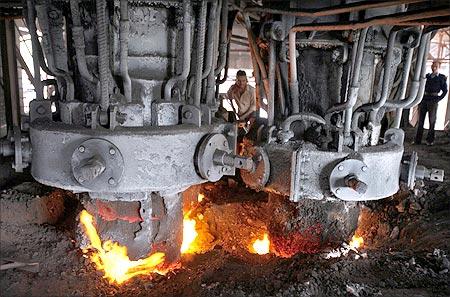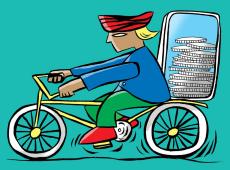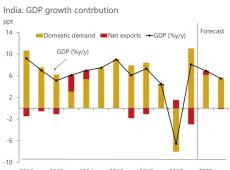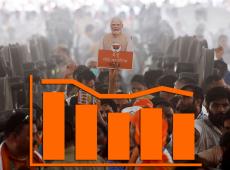EU criticises France for excessive debt, putting pressure on Macron during election campaign
By Rediff Money Desk, Brussels Jun 19, 2024 17:08
The EU Commission has criticized France for its high debt levels, putting pressure on President Macron ahead of the upcoming elections. The move comes as Macron faces stiff competition from both the left and right.

Brussels, Jun 19 (AP) The European Union's executive arm on Wednesday criticised France for running up excessive debt, a stinging rebuke at the height of an election campaign where President Emmanuel Macron is facing a strong challenge from the extreme right and the left.
The EU Commission recommended to seven nations, including France, that they start a so-called excessive deficit procedure, the first step in a long process before any member state can be hemmed in and moved to take corrective action.
Deficit criteria is not fulfilled in seven of our member states," said EU Commission Vice President Valdis Dombrovskis, pointing the finger at Belgium, France, Italy, Hungary, Malta, Slovakia and Poland, in addition to France.
For decades, the EU has set out targets for member states to keep their annual deficit within 3 per cent of Gross Domestic Product and overall debt within 60 per cent of output. Those targets have been disregarded when it was convenient, sometimes even by countries like Germany and France, the biggest economies in the bloc.
This time, however, Dombrovskis said that a decision needs to be done based on, say, facts and whether the country respects the treaty, reference values for a deficit and debt and not based on the size of the country.
The French annual deficit stood at 5.5 per cent last year.
Over the past years, exceptional circumstances like the COVID-19 crisis and the war in Ukraine allowed for leniency, but that has now come to an end.
Still, Wednesday's announcement touched a nerve in France, after Macron called snap elections in the wake of his defeat to the hard right of Marine Le Pen in the EU parliamentary polls on June 9.
Le Pen's National Rally and a new united left front are polling ahead of Macron's party in the elections, and both challengers have put forward plans where deficit spending to get out of the economic rut is essential.
In the election campaign, Macron's camp could use the wrist-slap as a warning that the extremes will drive France to ruin, while the opposition could claim that Macron had overspent and still impoverished the French, leaving them no choice but to spend more still.
Despite the rebuke over excessive debt, EU Economy Commissioner Paolo Gentiloni stressed France was also moving in the right direction to address certain imbalances, sending a message of reassurance" to the EU institutions.
The International Monetary Fund forecasts that the French economy will grow at a relatively sluggish 0.8 per cent of GDP in 2024, before rising to 1.3 per cent in 2025.
And unlike the measures imposed on Greece during its dramatic fiscal crisis a decade ago, he said that excessive austerity was not an answer for the future.
"Much less does not mean back to austerity, because this would be a terrible mistake, he said.
He also disputed a claim that it was austerity itself drove voters to veer to the extreme right, pointing out that lenient budget conditions had been in force for the past years and still allowed the hard right to come out as victors in many member states.
Look to what happened in the recent elections. If the theory is less expenditure, stronger extremes,' well, we are not coming from a period of less expenditure, Gentiloni said.
The EU Commission recommended to seven nations, including France, that they start a so-called excessive deficit procedure, the first step in a long process before any member state can be hemmed in and moved to take corrective action.
Deficit criteria is not fulfilled in seven of our member states," said EU Commission Vice President Valdis Dombrovskis, pointing the finger at Belgium, France, Italy, Hungary, Malta, Slovakia and Poland, in addition to France.
For decades, the EU has set out targets for member states to keep their annual deficit within 3 per cent of Gross Domestic Product and overall debt within 60 per cent of output. Those targets have been disregarded when it was convenient, sometimes even by countries like Germany and France, the biggest economies in the bloc.
This time, however, Dombrovskis said that a decision needs to be done based on, say, facts and whether the country respects the treaty, reference values for a deficit and debt and not based on the size of the country.
The French annual deficit stood at 5.5 per cent last year.
Over the past years, exceptional circumstances like the COVID-19 crisis and the war in Ukraine allowed for leniency, but that has now come to an end.
Still, Wednesday's announcement touched a nerve in France, after Macron called snap elections in the wake of his defeat to the hard right of Marine Le Pen in the EU parliamentary polls on June 9.
Le Pen's National Rally and a new united left front are polling ahead of Macron's party in the elections, and both challengers have put forward plans where deficit spending to get out of the economic rut is essential.
In the election campaign, Macron's camp could use the wrist-slap as a warning that the extremes will drive France to ruin, while the opposition could claim that Macron had overspent and still impoverished the French, leaving them no choice but to spend more still.
Despite the rebuke over excessive debt, EU Economy Commissioner Paolo Gentiloni stressed France was also moving in the right direction to address certain imbalances, sending a message of reassurance" to the EU institutions.
The International Monetary Fund forecasts that the French economy will grow at a relatively sluggish 0.8 per cent of GDP in 2024, before rising to 1.3 per cent in 2025.
And unlike the measures imposed on Greece during its dramatic fiscal crisis a decade ago, he said that excessive austerity was not an answer for the future.
"Much less does not mean back to austerity, because this would be a terrible mistake, he said.
He also disputed a claim that it was austerity itself drove voters to veer to the extreme right, pointing out that lenient budget conditions had been in force for the past years and still allowed the hard right to come out as victors in many member states.
Look to what happened in the recent elections. If the theory is less expenditure, stronger extremes,' well, we are not coming from a period of less expenditure, Gentiloni said.
Source: ASSOCIATED PRESS
DISCLAIMER - This article is from a syndicated feed. The original source is responsible for accuracy, views & content ownership. Views expressed may not reflect those of rediff.com India Limited.
You May Like To Read
TODAY'S MOST TRADED COMPANIES
- Company Name
- Price
- Volume
- GTL Infrastructure
- 2.93 ( -4.87)
- 226206286
- IFL Enterprises
- 1.30 (+ 4.84)
- 81461564
- Vodafone Idea L
- 16.79 (+ 0.66)
- 67447398
- NCL Research
- 0.95 ( -4.04)
- 31996628
- Franklin Industries
- 3.73 (+ 3.32)
- 21511209
MORE NEWS

UK Inflation Stays at 2% Target, Rate Cut...
UK inflation held steady at 2% in June, leaving the Bank of England's interest rate...
Peru's Camposol & Ninjacart Partner for Indian...
Peruvian blueberry producer Camposol partners with Ninjacart to expand premium...
Arunachal Pradesh to Draft New Industrial Policy
Arunachal Pradesh plans to create a new industrial policy aimed at attracting...












 © 2024 Rediff.com India Limited. All rights reserved.
© 2024 Rediff.com India Limited. All rights reserved.